Related Research Articles

Face to Face is the fourth studio album by the English rock band the Kinks, released in October 1966. The album marked a shift from the hard-driving style of beat music that had catapulted the group to international acclaim in 1964, instead drawing heavily from baroque pop and music hall. It is their first album consisting entirely of Ray Davies compositions, and has also been regarded by critics as one of rock's first concept album. Davies' blossoming songwriting style became increasingly observational and satirical, commenting on English culture, social class and the music industry.
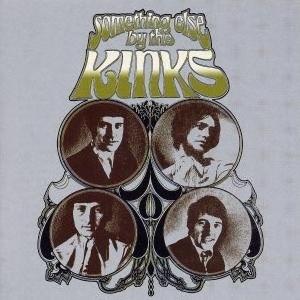
Something Else by the Kinks, often referred to simply as Something Else, is the fifth UK studio album by the Kinks, released in September 1967. The album continued the Kinks' trend toward an eccentric baroque pop and music hall-influenced style defined by Ray Davies' observational and introspective lyrics. It also marks the final involvement of American producer Shel Talmy in the Kinks' 1960s studio recordings; henceforth Ray Davies would produce the group's recordings. Many of the songs feature the keyboard work of Nicky Hopkins and the backing vocals of Davies's wife, Rasa. The album was preceded by the singles "Waterloo Sunset", one of the group's most acclaimed songs, and the Dave Davies solo record "Death of a Clown", both of which charted in the UK top 3.
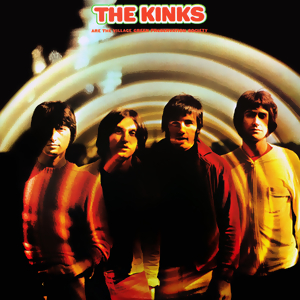
The Kinks Are the Village Green Preservation Society is the sixth studio album by the English rock band the Kinks. It was released on 22 November 1968 in the United Kingdom by Pye Records and in February 1969 in the United States by Reprise Records. A commercial failure on release, it was the band's first studio album which failed to chart in either country, but was lauded by contemporary critics for its songwriting. It was embraced by America's new underground rock press, completing the Kinks' transformation from mid-1960s pop hitmakers to critically favoured cult band.

Arthur , often referred to as just Arthur, is the seventh studio album by the English rock band the Kinks, released in October 1969. Kinks frontman Ray Davies constructed the concept album as the soundtrack to a Granada Television play and developed the storyline with novelist Julian Mitchell; the television programme was never produced. The rough plot revolved around Arthur Morgan, a carpet-layer, who was based on Ray and guitarist Dave Davies' brother-in-law Arthur Anning.

The Kinks were an English rock band formed in Muswell Hill, north London, in 1963 by brothers Ray and Dave Davies. They are regarded as one of the most influential rock bands of the 1960s. The band emerged during the height of British rhythm and blues and Merseybeat, and were briefly part of the British Invasion of the United States until their touring ban in 1965. Their third single, the Ray Davies-penned "You Really Got Me", became an international hit, topping the charts in the United Kingdom and reaching the Top 10 in the United States.

"Dandy" is a 1966 song by the Kinks, appearing on their album Face to Face.

"I'm Not Like Everybody Else" is a song written by Ray Davies and first recorded by the Kinks in 1966 and released that year as the B-side of "Sunny Afternoon". The lead vocal is sung by Dave Davies, with occasional parts vocalized by his brother Ray, the band's usual lead singer. The song is a defiant anthem of non-conformity. It has been covered by various artists, notably the Chocolate Watchband in their 1968 rendition of the song.

"Dead End Street" is a song by the British band the Kinks from 1966, written by main songwriter Ray Davies. Like many other songs written by Davies, it is to some degree influenced by British Music Hall. The bass playing was partly inspired by the "twangy" sound of Duane Eddy's guitar. It was originally released as a non-album single, but has since been included as one of several bonus tracks from the Face to Face CD. The song, like many others by the group, deals with the poverty and misery found in the lower classes of English society.

"Come Dancing" is a 1982 song written by Ray Davies and performed by British rock group the Kinks on their 1983 album State of Confusion. The song was inspired by Davies' memories of his older sister, Rene, who died of a heart attack while dancing at a dance hall. The lyrics, sung from the perspective of an "East End barrow boy," are about the boy's sister going on dates at a local Palais dance hall.
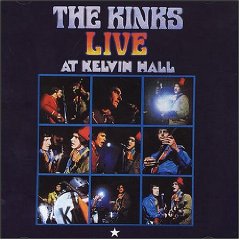
Live at Kelvin Hall is a 1967/68 live album by the English rock group the Kinks. It was recorded at Kelvin Hall in Glasgow, Scotland, in early 1967. The album was released in August 1967 in the US, and January 1968 in the UK. Live at Kelvin Hall received mixed reviews upon release, and sold poorly.

"Drivin'" is a song written by Ray Davies of the Kinks which appeared on that group's 1969 concept album Arthur . It was released in the UK as the first single from the album, but failed to chart.

"A Rock 'n' Roll Fantasy" is the lead single and fourth track from The Kinks' 1978 album Misfits. Written by Ray Davies, the song was inspired by the band's then-tumultuous state at the time, with two members leaving the band during the recording of Misfits. Released as the first single from the album, the track was the band's most successful single in years, reaching number 30.
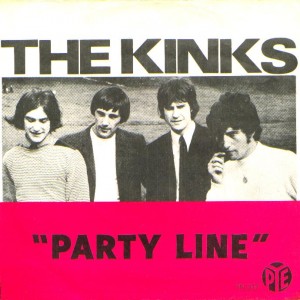
"Party Line" is the opening track from the Kinks' 1966 album, Face to Face. The songwriting is credited to Ray Davies. On one of the earliest covers of the album, the song is credited R.Davies - D.Davies.

"She's Got Everything" is a song written by Ray Davies and released by English rock band the Kinks. It first appeared as the B-side of the Kinks' 1968 single, "Days".
"Berkeley Mews", sometimes mislabeled as "Berkeley Men" or "Berkeley News", is a song written by Ray Davies and released by the Kinks as the B-side to their 1970 track, "Lola". Berkeley Mews is a small street in London.
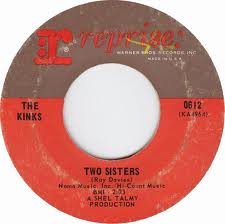
"Two Sisters" is the third track from the Kinks' 1967 album, Something Else by the Kinks. The song was written by Ray Davies.

"Lincoln County" is a 1968 song by British musician Dave Davies, who is best known as a guitarist for the rock band the Kinks. It was his third single.

"You Can't Stop the Music" is a song by the British rock band The Kinks. The song, appearing on the band's 1975 album Soap Opera, was written by the band's principal songwriter, Ray Davies.

"Ducks on the Wall" is a song by the British rock band the Kinks. The song, appearing on the band's 1975 album Soap Opera, was written by the band's principal songwriter, Ray Davies.

"Rock 'n' Roll Cities" is a song by the British rock group, the Kinks. The song appeared on the band's 1986 album, Think Visual, and, unlike most other Kinks songs, it was written by Dave Davies rather than his brother, Ray.
References
- ↑ Hinman 2004, p. 84.
- ↑ "Steve Smith: Wyman and Taylor join the Rolling Stones onstage; Coldplay takes a break". Archived from the original on 3 December 2012. Retrieved 2016-05-07.. Pasadena Star-News . 29 November 2012.
- 1 2 3 4 Kitts, Thomas M. (2014-05-25). Ray Davies: Not Like Everybody Else.
- ↑ Stephen Thomas Erlewine (1966-10-28). "Face to Face - The Kinks | Songs, Reviews, Credits, Awards". AllMusic. Retrieved 2014-06-13.
Sources
- Hinman, Doug (2004). The Kinks: All Day and All of the Night: Day-by-Day Concerts, Recordings and Broadcasts, 1961–1996. San Francisco, California: Backbeat Books. ISBN 978-0-87930-765-3.